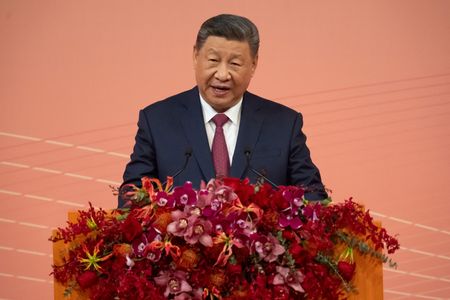By Joe Cash and Ben Blanchard
BEIJING/TAIPEI (Reuters) -China’s defence ministry on Friday broke its silence about days of military activities around Taiwan, saying it was entitled to stage exercises and the military would “not be absent” if required to fight separatist forces.
Taiwan’s defence ministry on Monday went on alert and activated an emergency response centre after reporting a surge in Chinese military activity, both nearby and more broadly in the East and South China Seas.
China’s military had not announced any manoeuvres. Beijing views democratically governed Taiwan as its territory – a claim rejected by Taipei, which says that only Taiwan’s people can decide their future.
In a statement responding to a question on Taiwan President Lai Ching-te’s recent visits to Hawaii and the U.S. territory of Guam, and whether or not China had held drills, China’s defence ministry offered neither confirmation nor denial.
“Whether or not to hold exercises and when to hold them is a matter for us to decide on our own according to our own needs and the situation of the struggle,” it said.
“Regardless of whether or not exercises are held, the People’s Liberation Army will not be absent and will not be soft in its fight against independence and for reunification.”
Any reliance on “foreign forces to seek independence” – the usual wording China uses to warn the United States off supporting Taiwan – would be severely punished and was “doomed to failure”, the ministry added.
China has staged two rounds of war games around Taiwan so far this year, most recently in October, saying they were a warning against “separatist acts” and vowing to take further action if needed.
TAIWAN SAYS CHINA’S THREAT IS EXPANDING
On Friday, Taiwan’s defence ministry said China’s threat towards the island had been evolving since 2022, when it began staging the current round of war games, from “deterring Taiwan” to “impacting the First Island Chain”, an area that stretches from Japan through to Taiwan, along the Chinese coast and into the South China Sea.
“China’s long-term goal of deterring regional parties and disrupting the rule-based international order will not be endorsed by the international community,” it said in a statement.
The United States has repeatedly expressed concern about tensions in the Taiwan Strait, and once or twice a month sends military aircraft or warships on missions there.
Late on Friday, Taiwan’s defence ministry said a U.S. P-8A Poseidon reconnaissance and patrol plane had flown through the Taiwan Strait in the morning, the first such publicly acknowledged flight since Nov. 26.
Security sources had expected China to hold drills to coincide with Lai’s U.S. trip, and also to send a warning to the incoming Trump administration about China’s red lines.
On Thursday, the de facto U.S. embassy in Taiwan said that Chinese military activity in the region was currently elevated but it did not see that as a response to Lai’s U.S. visit.
Later that day, Taiwan’s defence ministry said it had disbanded its emergency response centre, signalling an end to the current round of Chinese military activities.
On Friday morning, the ministry said the number of Chinese military aircraft operating nearby was down sharply.
Taiwan’s coast guard said that nine Chinese coast guard ships off the coast had headed northwards after carrying out “undue” activities in recent days.
(Reporting by Joe Cash and Ben Blanchard; Editing by Shri Navaratnam, Michael Perry and Kevin Liffey)










